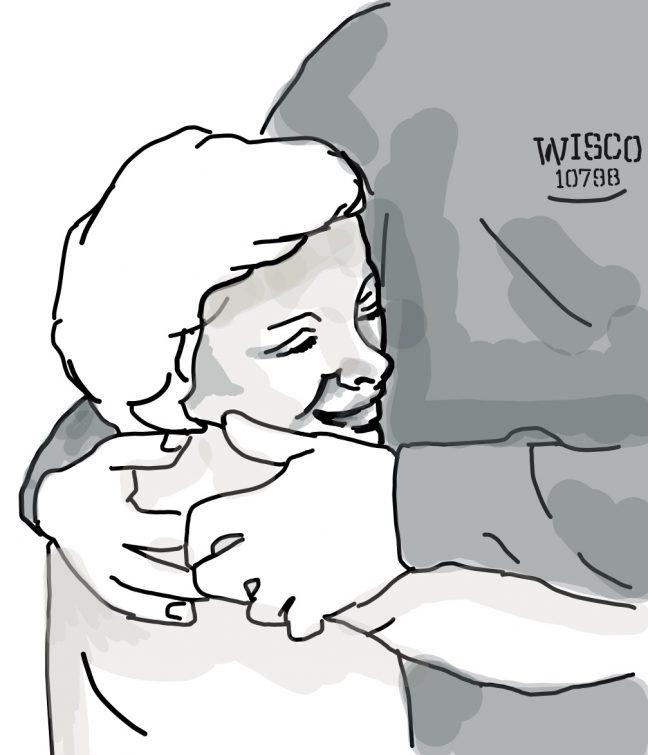For Wisconsin elementary school student Kavon, summer camp was never financially feasible. That is, until this past summer.
Kavon’s mother Keana is incarcerated at Taycheedah Correctional Institution, Wisconsin’s only maximum security prison for women, which means the two have had limited contact since Keana’s incarceration in January 2018. But fortunately, the pair qualified for participation in Camp Reunite, a first-of-its-kind program which aims to foster the relationship between incarcerated mothers and their children.
At Camp Reunite, the children spend time at a campsite about 30 miles from Taycheedah, participating in regular camp activities like swimming, climbing, archery and kayaking. Then, the children board a bus to Taycheedah, where they enjoy time with their mothers playing games, sharing a meal and doing arts and crafts.
The goal of Camp Reunite is to “nurture a healthy bond between mothers and children,” and to give children of incarcerated mothers the opportunity to connect with other children contending the same challenges.
Lawsuit shines light on impact of solitary confinement on youth mental health
“It gives them an opportunity to meet other friends that are in the same situation as them and they can speak their feelings and not just keep a secret from the kids at school,” Kavon explained.
For 29-year-old Adriana, Camp Reunite gave her daughter an opportunity she never had. Adriana’s mother was incarcerated while she was growing up and Adriana recognizes the significant impact it had on her childhood.
“You can’t talk to them when you’re going through something,” Adriana said. “You can’t see them whenever you want to.”
Adriana’s daughter, 10-year-old Tiana, now faces the same reality while Adriana serves her sentence at Taycheedah, but through Camp Reunite’s trauma-informed approach, Tiana has the opportunity to break the cycle of violence and incarceration.
“A Shared Sentence: the devastating toll of parental incarceration on kids, families and communities” is a 2016 report compiled by the Annie E. Casey Foundation which explains the impact that having incarcerated parents can have on a child’s life and suggests several courses of action to alleviate the impacts.
One such suggestion is “Ensure children are supported while parents are incarcerated and after they return.” Camp Reunite is a unique way to support children, because they are being supported by their own families, and they gain access to a unique community of children who share similar experiences. 37-year-old Xiomara explained that Camp Reunite has helped her son open up emotionally about her incarceration — a drastic improvement from his naturally shy tendencies.
We’ve all heard the saying, do the crime, do the time — a concept that has led to abhorrent treatment of incarcerated persons, higher rates of incarceration of people of color, and recidivism. But one often forgotten consequence of our nation’s flawed incarceration system is that millions of children are suffering the consequences of their parents’ sentences and America’s tough-on-crime practices.
Prison labor exploitative, unjust, unproductive toward inmate rehabilitation
Programs like Camp Reunite are vital to the transformation of the prison system into what it should be, which is a reformatory system. Taycheedah warden Sarah Cooper highlighted this perspective as vital to the work at Taycheedah.
“People that are incarcerated in our system are still human and certainly their children have never done anything to be punished,” Cooper said. “So our job within the system is to provide them with every opportunity possible to improve upon themselves so they can be successful.”
The goal of the prison system must be to help people learn from mistakes and work to do better going forward. Programs which facilitate healthy intra-family dynamics and establish support systems for post-incarceration life are vital to this goal.
Furthermore, this goal should not only apply to the incarcerated person, but also to their future generations. One study suggests that children of incarcerated parents are six times as likely to be incarcerated in adulthood than other children, with children of incarcerated mothers even more likely. By supporting programs like Camp Reunite, current and future generations are far more likely to lead better lives going forward, and that is something that we must make space for in our communities.
Cait Gibbons ([email protected]) is a junior studying math and Chinese.





















